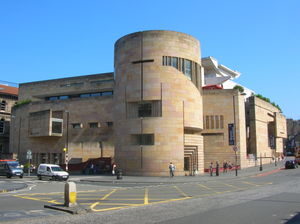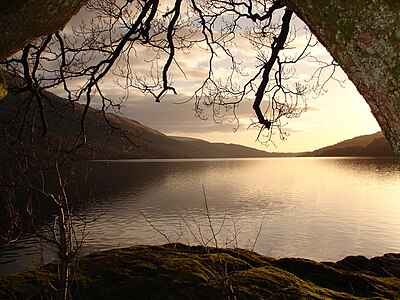Portal:Scotland
| Main Page | Selected articles 1 | Selected articles 2 | Selected biographies | Selected quotes | Selected pictures | Featured Content | Categories & Topics |
Introduction
 |

|
|

| ||
Scotland (Scots: Scotland; Scottish Gaelic: Alba) is a country that is part of the United Kingdom. It contains nearly one-third of the United Kingdom's land area, consisting of the northern part of the island of Great Britain and more than 790 adjacent islands, principally in the archipelagos of the Hebrides and the Northern Isles. To the south-east, Scotland has its only land border, which is 96 miles (154 km) long and shared with England; the country is surrounded by the Atlantic Ocean to the north and west, the North Sea to the north-east and east, and the Irish Sea to the south. The population in 2022 was 5,436,600 and accounts for 8% of the population of the UK. Edinburgh is the capital and Glasgow is the largest of the cities of Scotland.
The Kingdom of Scotland emerged in the 9th century. In 1603, James VI inherited England and Ireland, forming a personal union of the three kingdoms. On 1 May 1707 Scotland and England combined to create the new Kingdom of Great Britain, with the Parliament of Scotland subsumed into the Parliament of Great Britain. In 1999 a Scottish Parliament was re-established, and has devolved authority over many areas of domestic policy. The country has a distinct legal system, educational system, and religious history from the rest of the UK, which have all contributed to the continuation of Scottish culture and national identity. Scottish English and Scots are the most widely spoken languages in the country, existing on a dialect continuum with each other. Scottish Gaelic speakers can be found all over Scotland, however the language is largely spoken natively by communities within the Hebrides. The number of Gaelic speakers numbers less than 2% of the total population, though state-sponsored revitalisation attempts have led to a growing community of second language speakers.
The mainland of Scotland is broadly divided into three regions: the Highlands, a mountainous region in the north and north-west; the Lowlands, a flatter plain across the centre of the country; and the Southern Uplands, a hilly region along the southern border. The Highlands are the most mountainous region of the British Isles and contain its highest peak, Ben Nevis, at 4,413 feet (1,345 m). The region also contains many lakes, called lochs; the term is also applied to the many saltwater inlets along the country's deeply indented western coastline. The geography of the many islands is varied. Some, such as Mull and Skye, are noted for their mountainous terrain, while the likes of Tiree and Coll are much flatter. (Full article...)
Selected article

The National Museum of Scotland in Edinburgh, Scotland is a museum of Scottish history and culture.
It was formed in 2006 with the merger of the new Museum of Scotland, with collections relating to Scottish antiquities, culture and history, and the adjacent Royal Scottish Museum (opened in 1866 as the Edinburgh Museum of Science and Art, renamed in 1904, and for the period between 1985 and the merger named the Royal Museum of Scotland or simply the Royal Museum), with international collections covering science and technology, natural history, and world cultures. The two connected buildings stand beside each other on Chambers Street, by the intersection with the George IV Bridge, in central Edinburgh. The museum is part of National Museums Scotland. Admission is free.
The two buildings retain distinctive characters: the Museum of Scotland is housed in a modern building opened in 1998, while the former Royal Museum building was begun in 1861 and partially opened in 1866, with a Victorian Venetian Renaissance facade and a grand central hall of cast iron construction that rises the full height of the building, design by Francis Fowke and Robert Matheson. This building underwent a major refurbishment and reopened on 29 July 2011 after a three-year, £47 million project to restore and extend the building led by Gareth Hoskins Architects along with the concurrent redesign of the exhibitions by Ralph Appelbaum Associates. (Full article...) Read more ...
Selected quotes
" ... I think Calvinism has done more damage to Scotland than drugs ever did ... "
" ... A sense of proportion is anathema to the Glasgow drinker. When he goes at the bevvy it is a fight to the death ... "
In the news

- 7 May 2024 – Premiership of John Swinney
- The Scottish Parliament votes to elect John Swinney as First Minister of Scotland with 64 votes in favour and seven abstentions from the Scottish Greens. (BBC News)
- 6 May 2024 – 2024 Scottish National Party leadership election
- John Swinney is elected leader of the Scottish National Party following the resignation of First Minister Humza Yousaf. (The Guardian)
- 4 May 2024 – International reactions to the Israel–Hamas war
- Palestinian doctor and rector at the University of Glasgow Ghassan Abu-Sittah is denied entry into France after landing at Charles de Gaulle airport on his way to speak at the French Senate. Last month, he was denied entry into Germany. (Al Jazeera)
- 1 May 2024 – 2024 Scottish government crisis
- The Scottish National Party administration survives the vote of no confidence earlier this week, prompting the party to seek a replacement for outgoing First Minister Humza Yousaf. (Al Jazeera)
- 29 April 2024 – 2024 Scottish government crisis
- Ahead of a planned vote of no confidence, Scottish First Minister Humza Yousaf announces that he will resign from office. (CNBC) (The New York Times)
- 25 April 2024 – 2024 Scottish government crisis
- Premiership of Humza Yousaf
Selected biography

Sir Andrew Barron Murray OBE (born 15 May 1987) is a British professional tennis player. He was ranked world No. 1 in singles by the Association of Tennis Professionals (ATP) for 41 weeks, and finished as the year-end No. 1 in 2016. Murray has won three Grand Slam singles titles, two at Wimbledon (in 2013 and 2016) and one at the US Open (in 2012), and has reached eleven major finals. Murray was ranked in the top 10 for all but one month from July 2008 through to October 2017, and was no lower than world No. 4 in eight of the nine year-end rankings during that span. Murray has won 46 ATP Tour singles titles, including 14 Masters 1000 events and two gold medals at the Summer Olympics.
Originally coached by his mother Judy alongside his older brother Jamie, Murray moved to Barcelona at age 15 to train at the Sánchez-Casal Academy. He began his professional career around the time Roger Federer and Rafael Nadal established themselves as the two dominant players in men's tennis. Murray had immediate success on the ATP Tour, making his top 10 debut in 2007 at age 19. By 2010, Murray and Novak Djokovic had joined Federer and Nadal in the Big Four, the group of players who dominated men's tennis during the 2010s. Murray initially struggled against the rest of the Big Four, losing his first four major finals (three to Federer and one to Djokovic). He made his major breakthrough in 2012 by defeating Djokovic to win the US Open, becoming the first British major singles champion since Virginia Wade in 1977, and the first male champion since Fred Perry in 1936. A month earlier, he had won the men's singles gold medal against Federer at the 2012 London Olympics, and a silver medal in mixed doubles.
Selected picture
Loch Lomond (Scottish Gaelic: Loch Laomainn) is a freshwater Scottish loch, lying on the Highland Boundary Fault. It is the largest loch/lake in Great Britain, by surface area, and contains many islands, including Inchmurrin, the largest fresh water island in the British Isles.
Photo credit: Abubakr.h
Did You Know...

- ... that Mary Earle was born near Ben Nevis, and although she became a professor of food technology in New Zealand, she never forgot her Scottish roots?
- ... that Scottish nurse Euphemia Steele Innes was decorated with the Royal Red Cross first class for services with the Territorial Force Nursing Service in World War I?
- ... that backgammon was derived from the esteemed 16th-century Scottish and English tables game of Irish and eventually surpassed it in popularity?
- ... that the Aesculapian Club, founded in Edinburgh in 1773, still meets twice a year?
- ... that Brigadier Archie Miller-Bakewell registered the death of Prince Philip, Duke of Edinburgh?
- ... that today the Bishop of Edinburgh plays a ceremonial role at the coronation of Charles III and Camilla as a representative of the Walker Trustees?
- ... that Scottish physician George Gray received the thanks of the Chinese government for his work during the Manchurian plague of 1910–11?
- ... that Prince Philip was the first member of the British royal family to fly in a helicopter?
Get involved
For editor resources and to collaborate with other editors on improving Wikipedia's Scotland-related articles, see WikiProject Scotland.
To get involved in helping to improve Wikipedia's Scotland related content, please consider doing some of the following tasks or joining one or more of the associated Wikiprojects:
- Visit the Scottish Wikipedians' notice board and help to write new Scotland-related articles, and expand and improve existing ones.
- Visit Wikipedia:WikiProject Scotland/Assessment, and help out by assessing unrated Scottish articles.
- Add the Project Banner to Scottish articles around Wikipedia.
- Participate in WikiProject Scotland's Peer Review, including responding to PR requests and nominating Scottish articles.
- Help nominate and select new content for the Scotland portal.
Do you have a question about The Scotland Portal that you can't find the answer to?
Post a question on the Talk Page or consider asking it at the Wikipedia reference desk.
Related portals
Other language versions
Associated Wikimedia
The following Wikimedia Foundation sister projects provide more on this subject:
-
Commons
Free media repository -
Wikibooks
Free textbooks and manuals -
Wikidata
Free knowledge base -
Wikinews
Free-content news -
Wikiquote
Collection of quotations -
Wikisource
Free-content library -
Wikispecies
Directory of species -
Wikiversity
Free learning tools -
Wikivoyage
Free travel guide -
Wiktionary
Dictionary and thesaurus







































